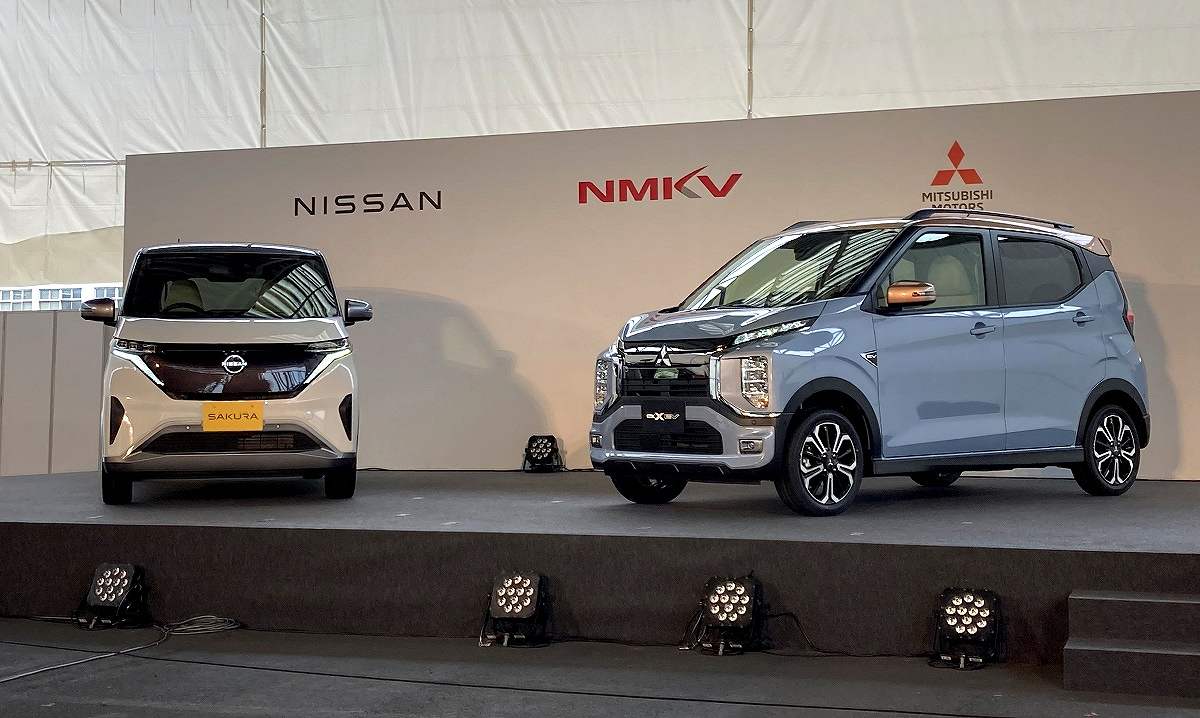
Nissan Motors Co and Mitsubishi Motor Corp unveil their jointly-developed light electric vehicles at a Mitsubishi Motors factory in Kurashiki, May 20, 2022.
17:05 JST, April 17, 2023
TOKYO (Jiji Press) — With an eye on potential growth in electric vehicle use in Japan, the government and ruling parties have launched discussions on a drastic review of the automobile-related tax system, which is still geared primarily to gasoline-engine vehicles.
The review was compelled by a “once-in-a-century period of change” in the automotive industry brought on by electrification and autonomous driving.
There is a backlash, however, against a mileage-based driving tax that has been proposed to deal with the transition to EVs, making it uncertain whether the tax will be actually introduced.
Currently, automobile-related taxes are levied on the purchase, possession and driving of a vehicle. In the driving stage, gasoline taxes, including the diesel oil delivery tax, are imposed on vehicles that run on gasoline.
As it does not apply to EVs, some argue that a new tax should cover the driving of EVs from the viewpoint of fairness.
Gasoline tax revenue fell from about ¥4.2 trillion in fiscal 2007 to about ¥3.2 trillion in fiscal 2021, partly due to improvements in fuel efficiency. The fall in revenue is likely to accelerate as the government has set a target that all new vehicles going on sale in Japan will be electrified models, including EVs, by 2035.
On the other hand, the government needs to secure financial resources to maintain and manage aging infrastructure such as roads and tunnels and to ensure that traffic safety measures are implemented.
In the tax system review, the National Governors’ Association stressed “the need to secure steady tax sources that can meet the funding demand of local governments.”
Under these circumstances, some in the central government and ruling parties have come up with a proposal to create a mileage-based driving tax that would be levied according to the distance traveled as a specific measure to secure financial resources.
At the government’s Tax Commission, an advisory panel to the prime minister, one member proposed the tax as a way of securing revenue sources. The tax has been introduced in Germany and the U.S. state of Oregon.
The proposal, however, met with howls of protest from the automotive industry, which fears that a further increase in the burden on drivers would cause a further shift away from vehicle ownership and driving. “Users should be protected from any heavier taxes,” an official from the Japan Automobile Manufacturers Association said.
Late last year, the ruling Liberal Democratic Party and its coalition partner, Komeito, started discussing a review of the automobile-related tax system at their respective tax panels. But no in-depth debate was held on the proposed new tax, with many noting that promoting electrification should be given priority as EVs have not been as popularized in Japan as in other countries.
In its fiscal 2023 tax system reform outline, the ruling bloc stopped short of coming to a conclusion on the issue. The outline said vaguely, “On the premise of working to secure stable financial resources in the central and local governments, we will proceed with discussions on a concrete framework to optimize burdens according to vehicle use.”
Prime Minister Fumio Kishida said his government has “not had any specific discussions” on the proposal.
There are many challenges that need to be cleared before the proposed mileage-based driving tax is introduced, as it would weigh heavily on residents in rural areas, who rely on vehicles as a means of mobility, and on logistics companies.
“We can’t win the approval of the public if we ask users to bear more of the burden because tax revenue is falling,” a senior official on a ruling party tax panel said. “Thanks to the development of logistics, we are in an era in which goods are delivered promptly to our homes. Therefore, even people who don’t drive are benefiting.”
A drastic review of the whole tax system is needed, with the relationship between benefits and burdens of vehicle ownership and use taken into account, the official said.
"Business" POPULAR ARTICLE
-

Keidanren Chairman Yoshinobu Tsutsui Visits Kashiwazaki-Kariwa Nuclear Power Plant; Inspects New Emergency Safety System
-

Imports of Rare Earths from China Facing Delays, May Be Caused by Deterioration of Japan-China Relations
-

University of Tokyo Professor Discusses Japanese Economic Security in Interview Ahead of Forum
-

Japan Pulls out of Vietnam Nuclear Project, Complicating Hanoi’s Power Plans
-

Govt Aims to Expand NISA Program Lineup, Abolish Age Restriction
JN ACCESS RANKING
-

Keidanren Chairman Yoshinobu Tsutsui Visits Kashiwazaki-Kariwa Nuclear Power Plant; Inspects New Emergency Safety System
-

Imports of Rare Earths from China Facing Delays, May Be Caused by Deterioration of Japan-China Relations
-

University of Tokyo Professor Discusses Japanese Economic Security in Interview Ahead of Forum
-

Japan Pulls out of Vietnam Nuclear Project, Complicating Hanoi’s Power Plans
-

Govt Aims to Expand NISA Program Lineup, Abolish Age Restriction























